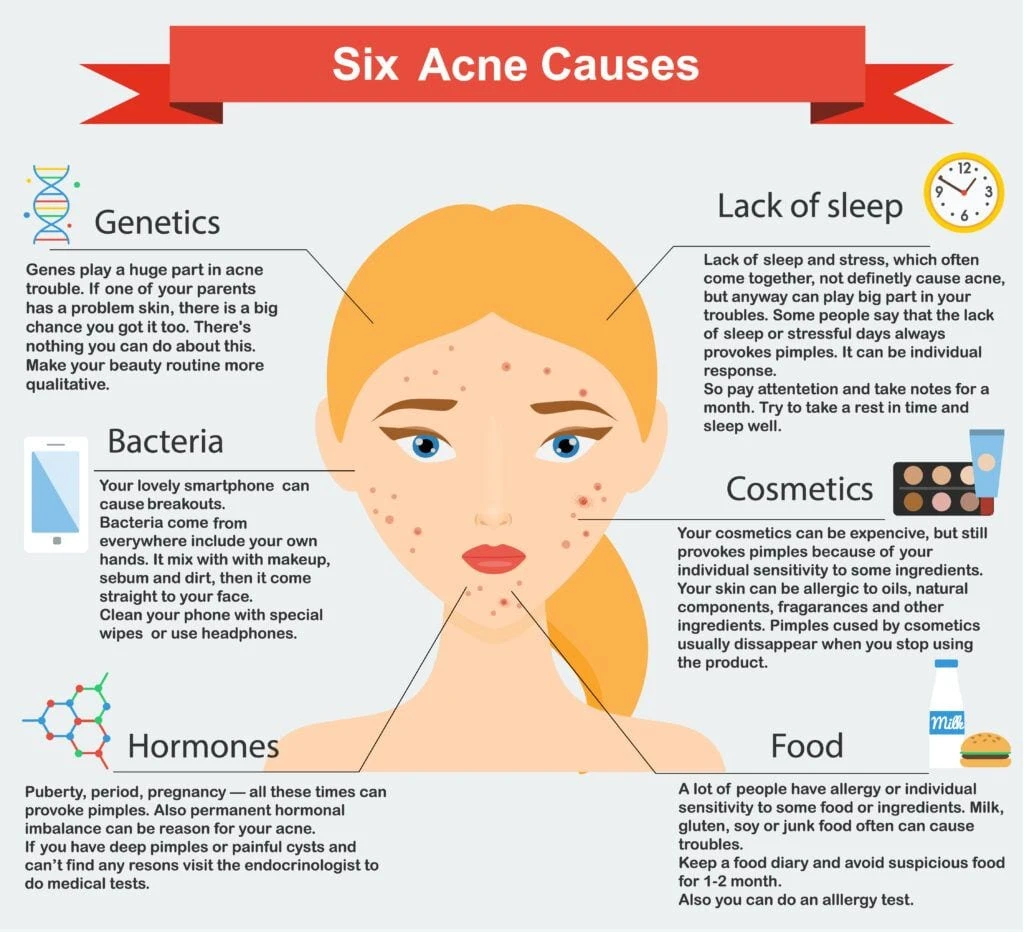What causes acne and how can i treat it?
What Causes Acne and How Can I Treat It?
Acne is one of the most common skin conditions, affecting people of all ages, especially during adolescence. It appears as pimples, blackheads, whiteheads, or cysts and can occur on the face, back, chest, or shoulders. Understanding what causes acne is the first step to treating it properly.
What Causes Acne?
Acne is mainly caused by four key factors:
-
Excess Oil (Sebum) Production:
Your skin naturally produces oil to keep it moisturized, but when too much sebum is produced, it can clog your pores. -
Clogged Pores with Dead Skin Cells:
When dead skin cells mix with excess oil, they can block hair follicles and create whiteheads or blackheads. -
Bacteria (Cutibacterium acnes):
The bacteria that live on your skin can become trapped in clogged pores. This leads to inflammation, redness, and pus-filled pimples. -
Hormonal Changes:
Hormonal fluctuations—common during puberty, menstruation, pregnancy, or stress—increase oil production and make you more prone to breakouts.
Other contributing factors include:
-
Genetics (family history of acne)
-
Diet (high-glycemic foods or dairy may worsen it for some)
-
Stress (triggers inflammation and hormone spikes)
-
Skincare or hair products (comedogenic ingredients can clog pores)
How Can I Treat Acne?
The best treatment depends on the type and severity of your acne. Here's a breakdown of common acne treatments:
1. Gentle Cleansing (Daily)
Use a mild, non-comedogenic cleanser to wash your face twice daily. Avoid harsh scrubs, which can irritate the skin and worsen acne.
Budget-friendly options:
-
CeraVe Foaming Cleanser
-
Cetaphil Daily Facial Cleanser
2. Over-the-Counter Treatments
Look for these active ingredients:
-
Salicylic Acid: Exfoliates inside pores to prevent clogs. Great for blackheads and whiteheads.
-
Benzoyl Peroxide: Kills acne-causing bacteria. Effective for inflamed pimples.
-
Adapalene (Differin): A topical retinoid that helps prevent clogged pores and reduces inflammation.
Apply a thin layer to clean, dry skin. Start with once a day to avoid dryness or irritation.
3. Moisturizer
Even oily or acne-prone skin needs hydration. Use an oil-free, non-comedogenic moisturizer to keep your skin barrier healthy.
Try:
-
Neutrogena Hydro Boost Gel
-
The Ordinary Natural Moisturizing Factors
4. Sunscreen
Sun exposure can worsen acne and darken scars. Use a lightweight, non-greasy SPF 30+ sunscreen every morning.
Good options:
-
La Roche-Posay Anthelios
-
Biore UV Aqua Rich
5. Lifestyle Tips
-
Wash pillowcases and makeup brushes regularly.
-
Avoid touching your face.
-
Eat a balanced diet and stay hydrated.
-
Reduce stress through exercise, rest, or relaxation.
6. See a Dermatologist (for Moderate to Severe Acne)
If OTC treatments don’t help after a few months, consult a dermatologist. Prescription treatments like topical retinoids, antibiotics, or even oral medications like birth control or isotretinoin may be recommended.
Summary:
Acne is caused by excess oil, clogged pores, bacteria, and hormonal changes. You can treat it with consistent skincare using ingredients like salicylic acid, benzoyl peroxide, or adapalene. Always cleanse gently, moisturize, and wear sunscreen. If acne is severe or persistent, see a dermatologist for personalized care.

Related Blog
What Causes Oily Skin and Can It Be Managed Naturally? Exploring Root Causes and Gentle Solutions
Aug 2, 2025 by Admin
General
What Are the Signs That You Have Sensitive Skin? Key Symptoms to Help You Identify This Delicate Skin Type
Aug 1, 2025 by Admin
General